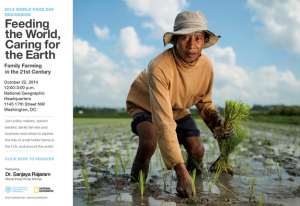Contents
USA & Canada | Thursday, October 16, 2014The 2014 Theme is:Family Farming: Feeding the World, Caring for the Earth
World Food Day is celebrated every year around the world on 16 October in honor of the date of the founding of the Food and Agriculture Organization of the United Nations in 1945. The day is celebrated widely by many other organisations concerned with food security, including the World Food Programme and the International Fund for Agricultural Development.
The World Food Day theme for 2014 is Family Farming: “Feeding the world, caring for the earth”
World Food Day is a day of action against hunger. On October 16, people around the world come together to declare their commitment to eradicate hunger in our lifetime. Because when it comes to hunger, the only acceptable number in the world is zero
World Food Day Celebrations:
In North America, grassroots events and public awareness campaigns engage diverse audiences in action against hunger. From hunger walks and World Food Day dinners to meal packaging events and food drives, there are many ways for people to be a part of solutions to hunger.
Each year, advocates come together to raise awareness and engage Americans and Canadians in the movement to end hunger. Led by the FAO Liaison Office for North America, the World Food Day USA & Canada Network includes over 60 organizations, universities and companies that are working to achieve a zero hunger world.
World Food Day Canada:
FREE PUBLIC EVENT
Be Inspired & Join the Movement!
Keynote Speaker: Dave Toycen, President & CEO of World Vision Canada
Featuring: African Children’s Choir
EVENT DETAILS
When: October 16, 2014
Where: Langley Events Centre
Banquet Room (upstairs)
*Live Streaming
Time: 10:30 am to Noon
World Food Day Events:
Events take place in over 150 countries to mark World Food Day. Below are example of events held across the world in recent years.
World Food Day India:
World Food Day is celebrated in honour of the date of the founding of the FAO of the United Nations in 1945. It is also now considered as Food Engineers’ Day.
World Food Day United States of America:
World Food Day USA:
World Food Day has been a tradition in the USA since the first World Food Day in 1982. In the United States the endeavor is sponsored by 450 national, private voluntary organizations.[1] One example for World Food Day events is the World Food Day Sunday Dinners that Oxfam America sponsors in collaboration with several other non profits. Emeritus Archbishop Desmond Tutu[3] and author Francis Moore Lappe[4] have teamed up with Oxfam America to promote World Food Day Sunday Dinners. The Iowa Hunger Summit has been held on or near World Food Day since 2007, and is organized by the World Food Prize in conjunction with their annual symposium in Des Moines, Iowa.
World Food Day Europe:
In Italy, ministries, universities, research agencies, international agencies and NGOs have organized many conferences as well as exhibitions and symposia. The Italian Ministry of Agriculture and Forestry Policies organized a meeting which focused on women’s rights in rural areas in 2005.
In Germany, the Federal Ministry of Consumer Protection, Food and Agriculture have all become involved via press conferences. Spanish television has been active in broadcasting events. FAO Goodwill Ambassador – Spanish soccer star Raul – has taken part in events and helped highlight food-security issues across his country.
World Food Day UK:
The UK Food Group has also been active through conferences and media broadcasts. In the emerging economies of Eastern Europe – i.e., Albania, Armenia, Croatia, Czech Republic, Georgia, Hungary, Macedonia, Moldova, Serbia and Montenegro, and Slovak Republic – a variety of activities have been held.
In Hungary, renowned experts have given presentations in the Hungarian Agricultural Museum and FAO, and WFD medals have been awarded to well-known Hungarian experts by the FAO Sub-Regional Representative.
On behalf of the Holy See, Popes John Paul II and Benedict XVI have sent an annual message for food producers and consumers on World Food Day.
World Food Day South Africa:
Angola celebrated WFD in 2005 through the 4th Forum on Rural Women, while in Burundi the second Vice-President planted potatoes to provide a symbolic example about food production. In Central African Republic, the President of the Republic has inaugurated a bridge at Boda to coincide with World Food Day, making the agricultural production area more accessible.
In Chad, thousands of people have attended debates, conferences and activities including theatre, films, folk dance, visits to project sites and visits by agricultural companies.
In Ghana, the Ministry of Food and Agriculture has hosted a food security conference, while Namibia has run an awareness campaign through national media.
Egypt has hosted a Forum on nutrition issues. Morocco and Tunisia have held seminars and exhibitions.
World Food Day Asia:
The Government of Bangladesh has been involved through organizing a food festival; in China in 2005, celebrations were organized in Qujing City, where numerous ethnical minorities live, by the Ministry of Agriculture and the Government of Qujing City, with the participation of a number of senior officials of the Government.
In the Democratic People’s Republic of Korea, seminars have been held and visits made to various project sites. The Ministry of Agriculture of Indonesia has in the past organized a major Food Expo in Bandung, West Java, while a Farmers’ and Fishermen’s Workshop of NGOs was held in Bali.
In Armenia, staff from the Ministry of Agriculture, non-governmental organizations, Armenian State Agriculture University, the donor community, international organizations, and the mass media have participated in the World Food Day ceremony. In Afghanistan, representatives of Ministries, embassies, UN agencies, International Financial Organizations, National and International NGOs and FAO staff have attended the World Food Day ceremony.
In Cyprus, special ceremonies have been organized in primary and secondary schools, where teachers explained the significance of World Food Day.
World Food Day Latin America:
In Chile, exhibitions of indigenous food products have been prepared by local communities. In Argentina, senior officials of the Government, academics, international organizations and the press have participated in the main ceremony. In Mexico in 2005, a National Campaign for a “Mexico Without Hunger” was held, with the involvement and support of civil society and students. In Cuba, producers have been able to exchange views and experiences at an agricultural fair. The media strongly supports awareness campaigns on World Food Day; for example in Venezuela there has been national coverage of events.
World Food Day Israel:
Leket Israel – The National Food Bank will mark World Food Day with a unique countrywide picking event. Volunteers are invited to four locations throughout Israel on Friday, 18 October to pick fruits and vegetables for distribution to the needy.
World Food Day Speech & Essay:
World Food Day is celebrated each year on 16 October, the day on which FAO was founded in 1945. The theme for World Food Day in 2014 is: “Family Farming: Feeding the world, caring for the earth”.
Family farming includes all family-based agricultural, forestry, fisheries and livestock activities, and it is linked to several areas of rural development. Both in developing and developed countries, family farming is the predominant form of agriculture in the food production sector. There are over 500 million family farms in the world, representing 98% of farm holdings. Their rural activities are managed and operated by a family and rely predominantly on family labor.
Focusing on family farming will help eradicate hunger, protect the environment and contribute to sustainable economic development.
Over 70% of the food insecure population in developing countries live in rural areas, and most of them are small-scale farmers who depend on agriculture for their livelihoods. In many regions, they are the main producers of the food consumed every day in our meals. To tackle the hunger problem, it will be essential to create an environment where family farmers can feed themselves and their families by their own means, by producing the food they eat and by selling their products on the market.
Family farmers are the stewards of their land. For them, water, land biodiversity and soils are not only a means of production; they are long-term investments for agricultural activities today and in the future. Family farmers know how to manage natural resources in a sustainable manner. They can offer solutions to mitigate and adapt to climate change.
Despite the fact that they do not enjoy the same level of access to resources, family farmers are innovative, hardworking and efficient. In the U.S., family farms constitute 96 percent of all farms. Working on 78 percent of all farmland, they produce 84 percent of all produce in the U.S., totaling 230 billion USD of sales. In many developing countries, agriculture is the main activity and source of income for a large proportion of the population. Investing in family farming presents a considerable potential for economic development.
The theme of World Food Day has been chosen to raise the profile of family farming and smallholder farmers. Several international initiatives signal the increased recognition of the important contribution of family farmers to world food security. The UN General Assembly designated 2014 as the “International Year of Family Farming” and the UN Secretary-General’s Zero Hunger Challenge includes of a specific target on improving family farmer’s productivity. Family farming is also high on the domestic agenda in the U.S., as shown by the recent adoption by the U.S. Senate of a resolution designating 2014 as International Year of Family Farming.
The objective of the World Food Day event Feeding the World, Caring for the Earth – Family Farming in the 21st Century is to promote awareness of the significant role of family and smallholder farmers in eradicating hunger and poverty, in providing food security and nutrition, improving livelihoods, managing natural resources, protecting the environment, and achieving sustainable development, in particular in rural areas. In particular, the dialogue will:
a) Develop a common understanding about the role of family farming at the global and domestic levels, today and in the future
b) Provide an overview of the present situation and future challenges and opportunities of family farming in the world and in the U.S.
c) Offer an opportunity to share experiences and knowledge on family farming practices
d) Discuss appropriate policies and enabling environment for sustainable development of family farming
World Food Day 2014 Theme Events Celebrations Speech Essay India USA UK Canada
Originally posted 2014-10-14 10:56:14.








